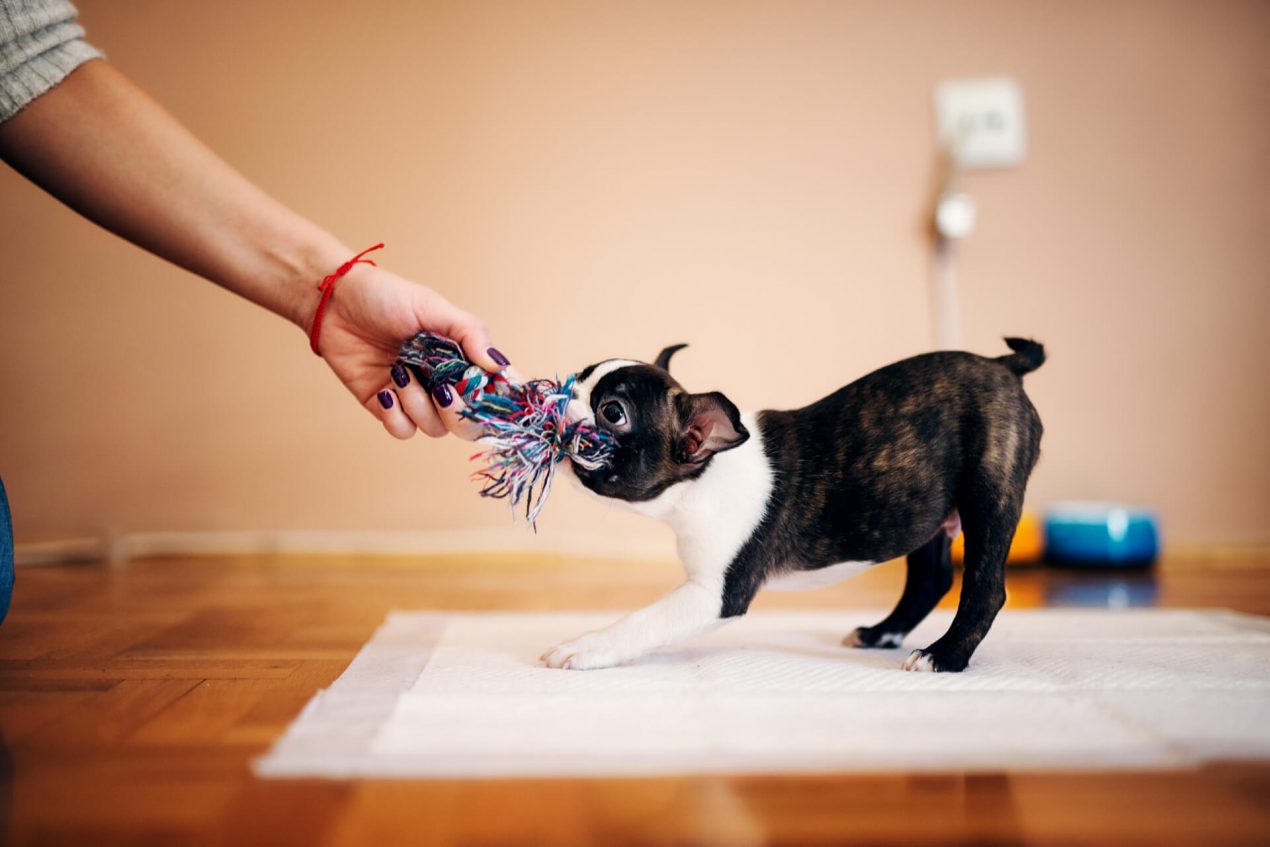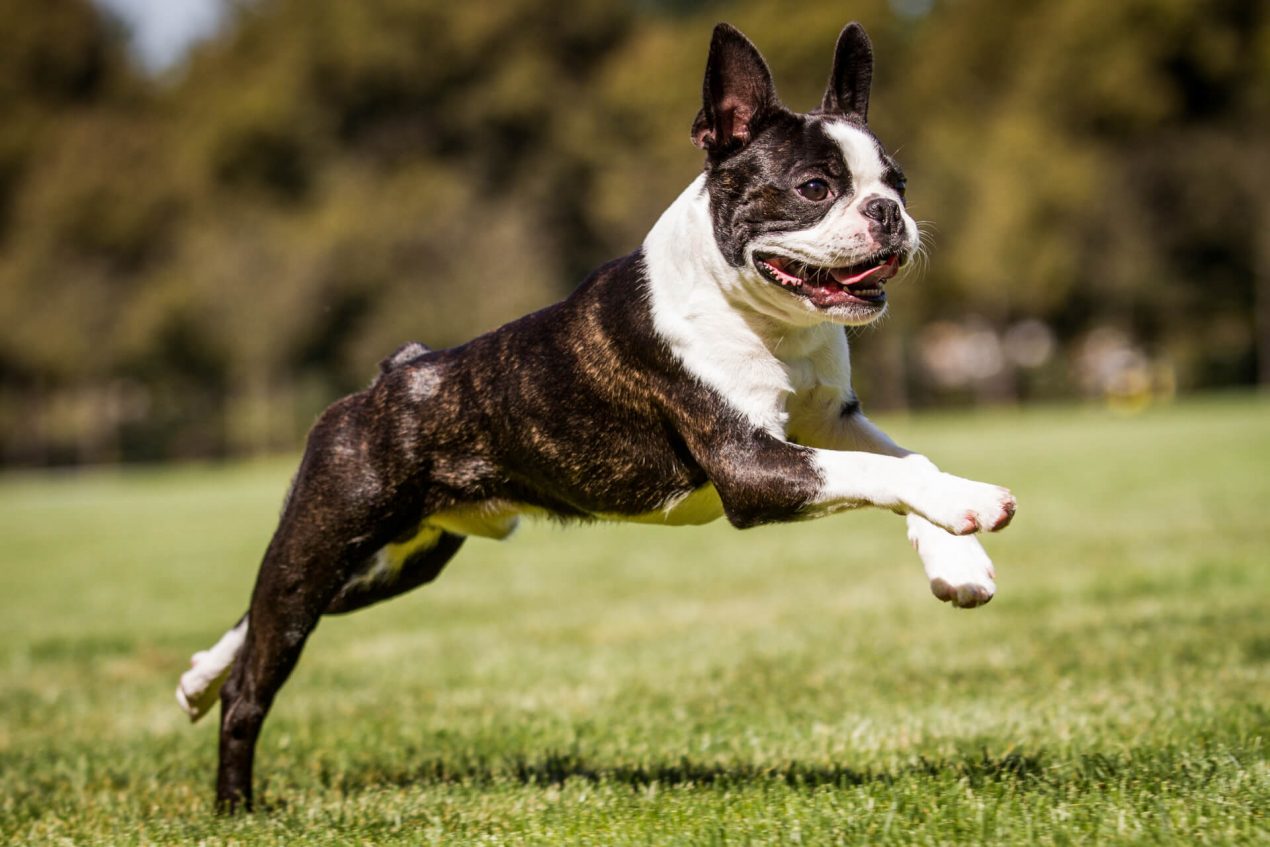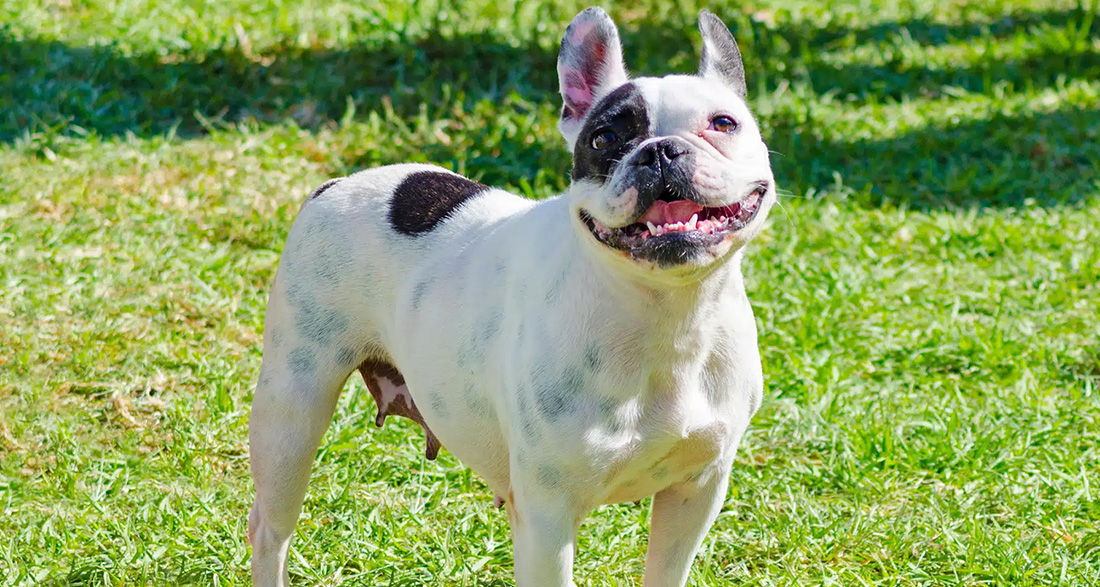The Boston Terrier is a popular and uncomplicated companion dog, especially in the USA, where its friendly nature spreads good vibes. Here in the profile, you’ll learn everything about the origin, temperament, and care of this easy-to-handle breed.
History of the Boston Terrier
The Boston Terrier, a young breed that emerged towards the end of the 19th century, is known for its unique origin and development. Originally resulting from the crossbreeding of the now-extinct White English Terrier and the English Bulldog, these dogs were initially bred for dog fights near the Canadian border. The resulting dog, known as the “Boston Bulldog” or “American Bullterrier,” had a strong appearance, similar to that of a boxer.
- Evolution into the modern breed: In 1893, the breed was officially recognized by the American Kennel Club (AKC) and renamed the “Boston Terrier.” To make the breed more suitable for everyday life, breeders later crossed French Bulldogs, leading to changes in stature and appearance.
- Cultural significance: The Boston Terrier played a significant role in American society. It was used as a mascot and was considered a symbol of morality and courage. The famous figure Sergeant Stubby, a Boston Terrier, became known for his service in World War I and even attended Yale University.
- Popular role in society: Boston Terriers quickly became popular companion dogs, valued for their gentle and affectionate nature. They are not considered restricted dogs and therefore are not subject to reporting requirements.
- Breeding and breed standards: Over the years, the breeding standards of the Boston Terrier have evolved. The AKC currently defines three weight classes and emphasizes the characteristic “tuxedo” appearance, as well as the coat colors black, brindle, and white. The FCI categorizes the breed in Group 9, “Companion and Toy Dogs.”
- Health and care: Due to their short coats and distinctive facial features, Boston Terriers are susceptible to brachycephalic syndrome. Careful breeding and care are crucial to maintaining the health of the breed.
Breed Overview
GROUP: Non-Sporting
HEIGHT: 15 to 17 inches
WEIGHT: 12 to 25 pounds
COAT: Short, smooth
COAT COLOR: Black and white; black, brindle, and white; brindle and white; seal and white; seal, brindle, and white
LIFE SPAN: 11 to 13 years
TEMPERAMENT: Affectionate, friendly, playful
HYPOALLERGENIC: No
ORIGIN: United States
Temperament and Character
Contrary to the original breeding goal, today’s Boston Terrier is anything but a fighting dog and is completely harmless. It is considered a cheerful and outgoing dog that is easy to train, even for beginners. Aggressive behavior is foreign to it, and it does not possess a hunting instinct. This loyal and reliable four-legged friend is therefore excellent as a family dog. However, it is a spirited dog that requires daily exercise. In interactions with other dogs, it shows strong self-confidence, sometimes overestimating itself. Additionally, it possesses a pronounced protective and guarding instinct.
| Affection Level | High |
| Friendliness | High |
| Kid-Friendly | High |
| Pet-Friendly | High |
| Exercise Needs | Medium |
| Playfulness | High |
| Energy Level | Medium |
| Trainability | Medium |
| Intelligence | Medium |
| Tendency to Bark | Medium |
| Amount of Shedding | Low |
Appearance of the Boston Terrier
The Boston Terrier is a small, pugnacious dog with a compact body and a stubby tail. Its unmistakable appearance is defined by its physical characteristics, making it a popular breed.
Size and Weight:
- Height: 15-17 inches (approximately 38-43 cm)
- Weight: 12-25 pounds (approximately 5.4-11.3 kg)
- Weight Classes: under 6.8 kg (light), 6.9-9 kg (medium), 9-11.3 kg (heavy)
Head and Face:
- Chunky head with distinctive erect “bat ears”
- Wrinkle-free face with a short muzzle
- Dark, expressive eyes
Coat:
- Short, smooth, and fine in texture
- Colors: Black, Seal (Black with a reddish sheen), Brindle
- White markings, preferably evenly distributed

Puppy Training
The Boston Terrier is an intelligent and cooperative dog that is easy to train. He is not resentful and forgives small mistakes. You should never treat the dog too roughly or unfairly to avoid damaging the relationship and frightening the little dog. Approach your companion dog with friendly and loving consistency.
Training Approaches:
- Short and effective training sessions: Keep training sessions short to avoid overwhelm. Focus on one or two commands at a time.
- Integration of training into daily life: Use daily routines for short training sessions to strengthen the bond and reinforce learning.
- Start with basic obedience commands: Begin with basic commands like sit, stay, come, and down.
- Patience is key: Every dog learns at their own pace. Stay patient and avoid frustration during training.
- Use clear commands: Be clear and precise in your commands to avoid misunderstandings.
Social behavior and training:
- Socialization of young dogs: Start socialization early to accustom your Boston Terrier to different environments and people.
- Leash training: Get your dog used to the leash to make walks enjoyable. Use positive reinforcement to reward good leash behavior.
- Training for good behavior: Teach impulse control and reward patient waiting for rewards.
- Training challenges: Use rewards for higher difficulty levels in training to challenge the intelligent Boston Terrier.
- Agility and skill training: Use the Boston Terrier’s playfulness and willingness to learn for agility training and mental stimulation.
Dealing with behavioral problems:
- Excessive barking: Teach the “quiet” command and address the underlying causes of barking, such as boredom or fear.
- Leash reactivity/pulling: Use gradual desensitization and positive interactions with other dogs to promote calm behavior during walks.
- Nipping and Biting: Early socialization and positive reinforcement are important to address nipping and biting behavior.
- House and crate training: Invest in puppy pads or a patch of grass for indoor training, especially in apartments.
Development-related behavioral changes:
- Behavioral changes during adolescence: Adjust training to the developmental stages of your Boston Terrier. Note that behavior can change from the puppy to the adult phase.
- Ongoing socialization: Continue socialization beyond puppyhood to maintain your Boston Terrier’s social skills and prevent fear or aggression towards unfamiliar situations.
Boston Terrier-specific training tips:
- Tricks and commands: Playfully teach your Boston Terrier tricks like “fetch,” “kisses,” “tidy up toys,” “retrieve,” “spin,” “speak,” “jump,” “sit pretty,” and “down.”
- Rewards and games: Make training sessions interactive and rewarding by including games and using toys as rewards.
Remember, patience and consistency are key to success in training your Boston Terrier. If needed, seek professional help from a qualified trainer or behavior therapist.
Activities with the Boston Terrier
The agile and spirited Boston Terrier is anything but a lap dog. He wants to be kept busy and requires regular play sessions and ample walks. Boston Terriers are particularly athletic and nimble. Play sessions with other dogs bring them great joy. Sporting activities such as agility are also quick to capture the interest of these athletic dogs. Additionally, small intelligence games and learning tricks serve as a complement to their daily exercise routine.

Health and Hereditary Diseases
Boston Terriers are susceptible to various health problems due to their distinctive skull and jaw shape. It is advisable to use chew toys or a dog toothbrush to prevent dental issues. Unfortunately, Boston Terriers are often affected by breeding practices that can lead to a range of illnesses.
Specific health problems:
- Breathing problems: Many Boston Terriers suffer from chronic breathing problems due to brachycephalic syndrome. Watch out for signs such as increased respiratory effort, snoring sounds, and shortness of breath.
- Eye problems: Common conditions include entropion, glaucoma, keratoconjunctivitis sicca (dry eye), and cataracts. Their large, protruding eyes make them particularly prone to injuries and infections. Regularly check their eyes for foreign bodies and irritations.
- Patellar luxation: A condition where the kneecap slips out of its normal position, leading to lameness and pain. Observe how your dog moves its knees to recognize signs of patellar luxation.
- Hemivertebrae: A spinal anomaly that can cause incontinence, poor coordination, or even paralysis.
Preventive measures and treatment:
- Conduct regular veterinary check-ups to detect problems early.
- Avoid overexerting your Boston Terrier and watch for signs of overheating.
- Provide appropriate nutrition and maintain a healthy weight to minimize breathing problems.
- Ensure special care and protection of the eyes.
Breeding practices:
- Choose responsible breeders who reduce the risk of genetic health problems.
- Ethics in breeding: Health and well-being should take precedence over aesthetic traits.
It is important that as future owners of this breed, you are informed about the health challenges and work closely with your veterinarian to ensure the best possible care and quality of life for your Boston Terrier.
Grooming a Boston Terrier
Caring for the Boston Terrier is very straightforward, as their short and smooth coat requires minimal brushing. It is sufficient to occasionally use a grooming glove to remove loose hair. Boston Terriers shed very little. During extreme temperatures, you should take precautions to protect your furry friend. In the summer, avoid the midday heat and provide your dog with ample opportunities to cool down. In the winter, it is advisable to dress the short-haired companion in a dog coat for warmth, but not as a costume.
Is the Boston Terrier Right for Me?
If you are considering getting a Boston Terrier, there are several important aspects to consider. This breed can live up to 15 years, which means a long-term commitment. Boston Terriers are undemanding and will thrive in both an urban apartment and a house with a garden, provided they get enough exercise.
Interaction with Children and Other Pets:
- Children: Boston Terriers are known for their friendly and affectionate nature. They are robust enough to play with children without getting easily irritated.
- Other Pets: They get along well with other pets, especially when socialized early.
Adaptation to Different Lifestyles:
- Active Individuals: They are well-suited for active owners as they require regular exercise.
- Families: Ideal for families as they are very playful and child-friendly.
- Seniors: Also suitable for seniors as they are loving companions and do not have excessive exercise needs.
Adaptation to Different Living Situations:
- Apartments: Well-suited for apartment living but require daily walks and playtime.
- Homes with Gardens: Enjoy the additional space for play and exercise.
Exercise and Mental Stimulation Needs:
- Exercise: Require daily walks and playtime to burn off their energy.
- Mental Stimulation: Intelligent breed that benefits from challenges and games.
Challenges in Urban Environments:
- Noise and Traffic: Can adapt well to urban environments, but early socialization is important.
- Limited Outdoor Space: Ensure sufficient exercise even with limited space.
- Separation Anxiety: Can be an issue if left alone for too long.
Price and Breeder Selection:
- Price: A purebred puppy can cost up to $2000.
- Breeder Selection: Ensure that the parent dogs have unobstructed breathing.
Boston Terriers are an excellent choice for various households and lifestyles. Their adaptable and lovable nature makes them ideal companions, both in the city and in the countryside. However, consider the long-term commitment and choose responsibly to bring a healthy and happy companion into your life.
Interesting and Worth Knowing
One truly heroic representative of the breed was the male Sergeant Stubby, who served for 18 months in the American military during World War I. He participated in four offensives and 17 battles and received many military honors. The dog warned his unit of poison gas attacks and artillery shells and helped locate wounded soldiers in no man’s land. Almost as heroic is the male Chopper the Biker Dog, who visits hospitals across the United States with his owner. With his empathetic nature, the therapy dog manages to bring a smile to the face of many patients. You can follow his work on his own Facebook page.
Boston Terrier Overview
Pros
- Personable
- Easy to Train
- Loyal
- Climate Adaptable
- Size
Cons
- High-Energy
- Shedding Fur
- Eye Issues
- Hip Dysplasia
Do you have a Boston Terrier or are you thinking of getting one? Tell me in the comments what makes them special in your opinion!


